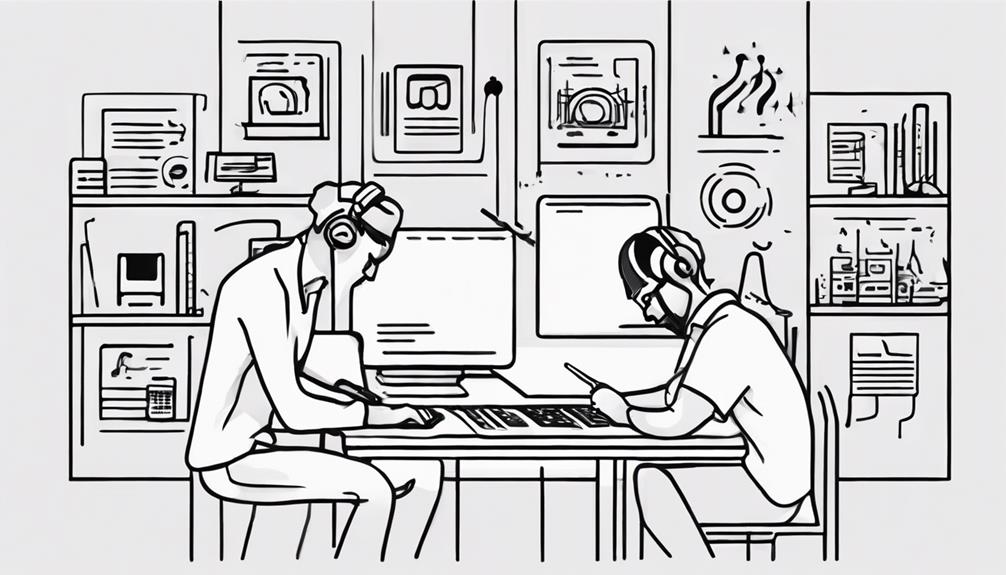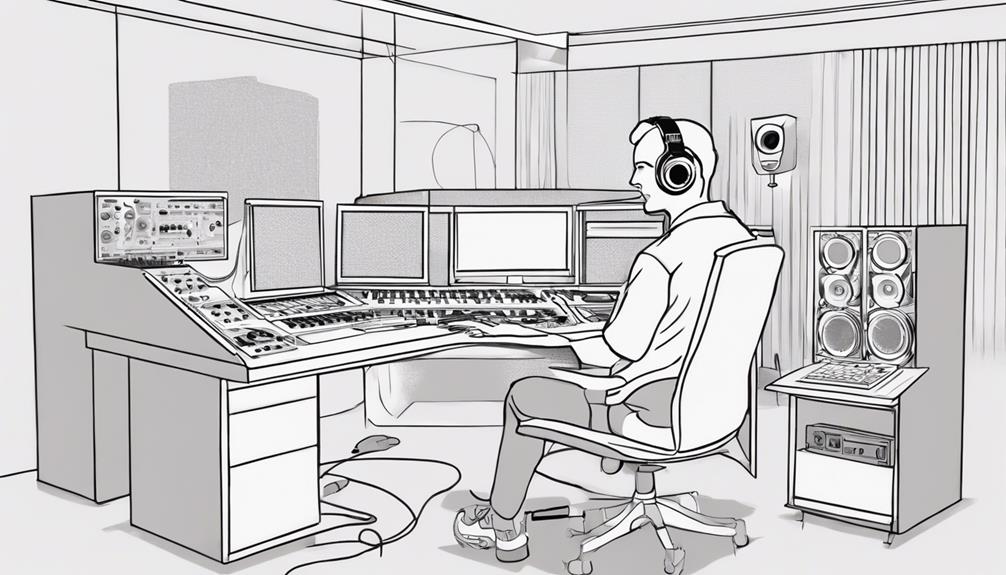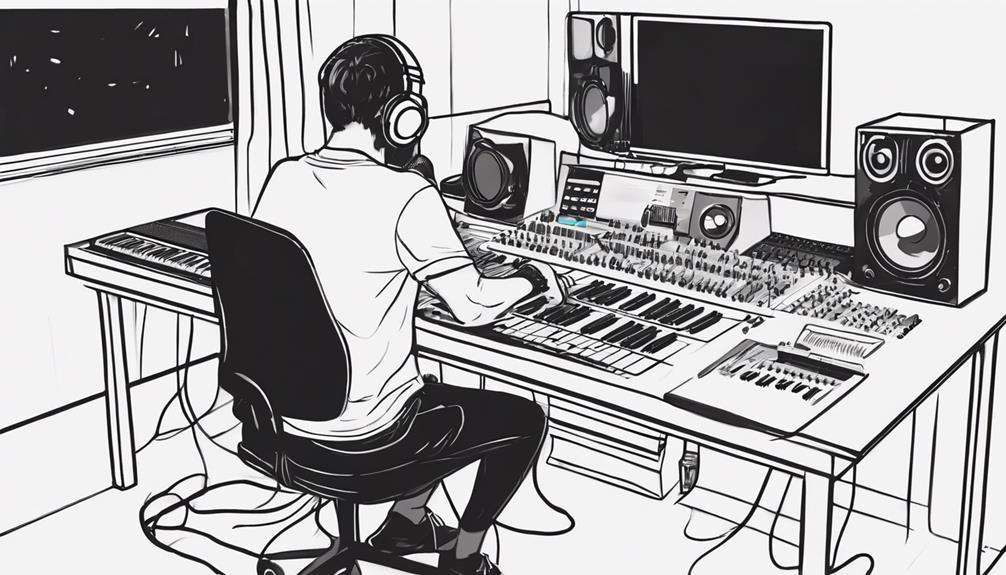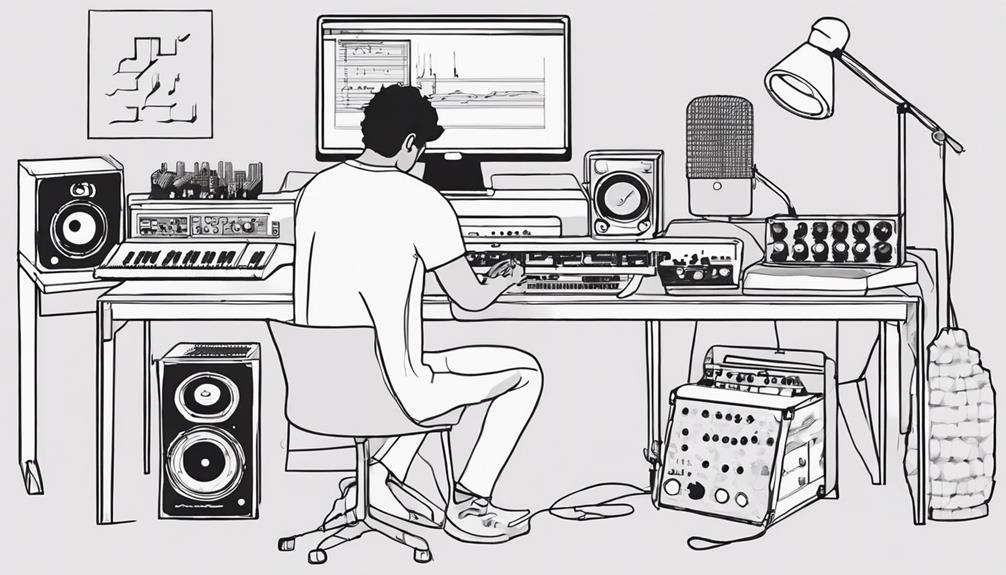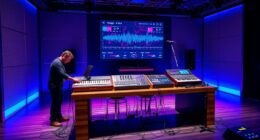Begin the journey of opening a music production company by starting with thorough market research to understand your target audience. Plan your finances, assess startup costs, and explore funding options. Equip your studio with essential gear and establish strong supplier relationships. Focus on online branding, engage on social media, and develop effective marketing strategies to build your client base. Each step is essential for success; from studio location to client relationship management. As you follow this step-by-step guide, you'll be well on your way to launching a thriving music production company. Additionally, consider diversifying your offerings by branching out and finding ways to start a music production library, which can serve as a valuable resource for licensing tracks to filmmakers, content creators, and advertisers. This not only opens up an additional revenue stream but also allows your work to reach a broader audience. Coupled with a commitment to high-quality production and consistent client satisfaction, your company will be well-positioned for long-term success.
Key Takeaways
- Conduct market research to understand target audience and industry trends.
- Develop a detailed business plan outlining budget, expenses, and funding sources.
- Invest in essential equipment and establish a professional studio setup.
- Build a strong portfolio showcasing diverse music production projects.
- Focus on online branding, marketing, and networking to attract clients and grow the business.
Market Research
Conduct surveys and focus groups to gain insight into your target market's preferences and spending habits when opening a music production company. Market research is essential for understanding the dynamics of the music production industry.
By utilizing online tools and resources, you can analyze market data and competition effectively. Establishing an online presence is vital in today's digital age, where consumers often discover and engage with businesses online.
Observing consumer needs and wants in the music production industry will provide invaluable insights for developing targeted marketing strategies. Identifying trends and patterns in the market will help you make informed business decisions and stay ahead of the competition.
Financial Planning
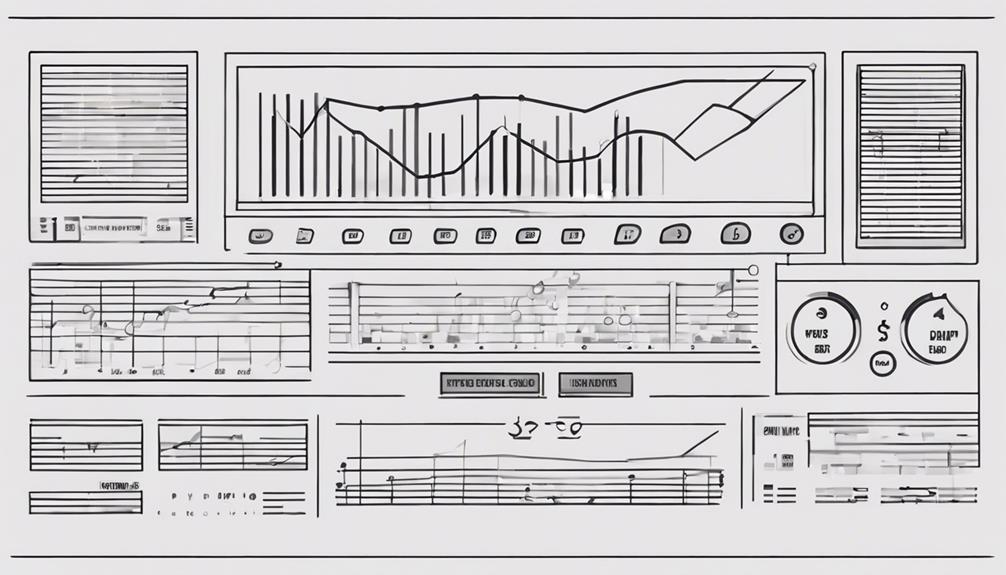
Estimate your startup costs and create a detailed budget to guarantee financial stability for your music production company.
Explore various funding options like personal savings, investors, loans, or grants to secure the capital needed.
Remember to set aside funds for marketing, professional development, and unexpected expenses in your financial plan.
Budgeting for Expenses
When launching a music production company, make sure that your financial planning includes a detailed budget outlining all necessary expenses. To successfully start a production company, you need to estimate various costs involved in the process. Here's a breakdown of key expenses you should consider when budgeting for your music production business:
| Expense | Description | Estimated Cost |
|---|---|---|
| Equipment | Purchase of recording gear, instruments, and production tools | $10,000 – $50,000 |
| Studio Space | Renting or building a studio with acoustics and soundproofing | $1,000 – $5,000/month |
| Marketing Expenses | Promotion, website development, social media advertising | $500 – $2,000/month |
Remember to research industry standards and factor in ongoing costs like licensing fees, salaries, utilities, and maintenance. By creating a thorough budget, you can effectively manage your expenses and ensure the smooth operation and growth of your music production company.
Securing Funding Sources
Explore various funding sources to secure the necessary capital for your music production company's startup. Start by looking into options such as personal savings, venture capitalists, or business loans. These avenues can provide the initial funds needed to establish your company.
Additionally, consider utilizing crowdfunding platforms like Kickstarter or Indiegogo to gather support from a wider audience passionate about creative projects. Investigate grants tailored for filmmakers and music producers offered by organizations, foundations, or government agencies as another potential funding source for your company.
Develop detailed financial projections to estimate the required funding amount and strategically plan its allocation for business growth. Keep a close eye on cash flow to guarantee efficient fund management and wise utilization to sustain and expand your music production business.
Equipment Needs
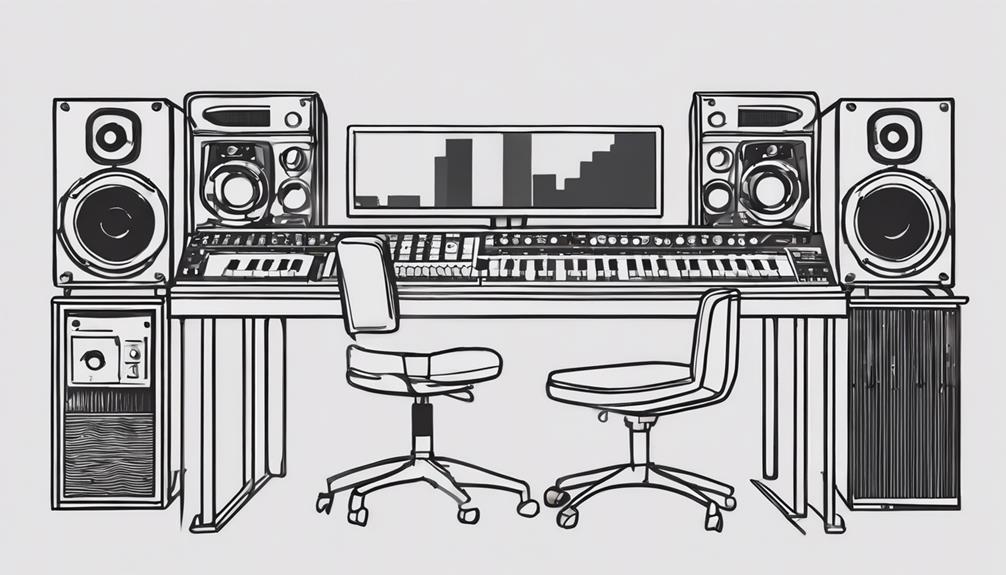
When setting up your music production company, you must carefully select essential gear like computers, microphones, and studio monitors.
Creating a professional recording studio setup with acoustic treatment and soundproofing is vital for excellent sound quality.
Additionally, investing in software tools such as digital audio workstations (DAWs) and audio plugins is essential for producing high-quality music.
Essential Gear Selection
Consider acquiring essential gear like high-quality microphones for your music production company. Invest in professional-grade condenser microphones to guarantee clear and detailed recordings of vocals and instruments.
Studio monitors are essential for accurate sound reproduction and mixing in production companies. Opt for models with a flat frequency response for precise audio monitoring during the production process.
Audio interfaces play an important role as they act as the bridge between your instruments, microphones, and computer, enabling high-quality audio recording and playback.
Additionally, MIDI keyboards are useful for creating and editing musical sequences, while digital audio workstations (DAWs) such as Pro Tools, Logic Pro, or Ableton Live are indispensable software tools for recording, editing, mixing, and mastering music tracks efficiently.
Prioritize these equipment needs to set up a well-equipped music production company ready for professional music creation.
Recording Studio Setup
To establish an efficient recording studio, make sure you have the necessary equipment like microphones, headphones, audio interfaces, studio monitors, and a computer. These are fundamental tools for successful music production in a recording studio setup.
Additionally, investing in acoustic treatment such as soundproofing panels and bass traps is vital to optimize sound quality within your studio environment.
High-quality recording software like Pro Tools, Logic Pro, or Ableton Live is essential for seamless music production processes.
To enhance the versatility of your studio, consider adding instruments like keyboards, guitars, and drum kits.
Furthermore, incorporating additional gear such as MIDI controllers, preamps, and signal processors can expand your production capabilities and creative options.
Software and Tools
Investing in essential software tools and equipment is crucial for the success of your music production company. To guarantee efficient music creation and editing, consider industry-standard software like Logic Pro, Ableton Live, Pro Tools, and FL Studio. These tools offer a wide range of features for composing, arranging, mixing, mastering, and adding effects to your music tracks.
Additionally, equip your studio with high-quality studio monitors, audio interfaces, MIDI controllers, and microphones to capture and manipulate sound effectively. Enhance the capabilities of your software with renowned plugins such as Native Instruments, Waves, and FabFilter. Moreover, don't overlook the importance of virtual instruments, sample libraries, and sound libraries to diversify the sounds and textures in your music productions.
Studio Location

When establishing a music production company, selecting a studio location with excellent acoustics, ample space, and minimal external noise is essential for ensuring high-quality music production. Consider factors like proximity to musicians, accessibility for clients, and availability of parking when choosing the right studio location. It is important to verify that the chosen space complies with zoning regulations and noise ordinances to prevent any legal complications. Research rental or purchase options in urban and suburban areas to find the best fit for your business plan. Evaluate the potential for expansion and growth when selecting a studio location to meet future business needs effectively. Utilize the table below to compare different studio locations based on key factors:
| Studio Location | Acoustics | Space | External Noise | Proximity to Musicians |
|---|---|---|---|---|
| Downtown Area | High | Limited | Moderate | Close proximity |
| Suburban Area | Good | Ample | Low | Potential commute |
| Industrial Zone | Varied | Large | Minimal | Isolated |
Supplier Relationships

When establishing your music production company, you need to carefully select suppliers who can provide the necessary equipment for your operations.
By negotiating terms and pricing effectively, you can optimize your budget and guarantee cost savings.
It's essential to maintain strong relationships with suppliers to secure timely access to quality gear and support services.
Supplier Selection Process
Regularly cultivating strong relationships with equipment suppliers is essential for the success of your music production company. As a music producer, the supplier selection process plays a significant role in ensuring you have access to high-quality gear for your productions.
Begin by conducting thorough research on potential suppliers to evaluate their reliability, quality, and compatibility with your business needs. It's important to establish clear communication channels with suppliers to address any issues promptly and maintain a strong working relationship. Additionally, negotiate favorable terms with suppliers to maintain cost-effectiveness and operational efficiency.
Regularly evaluating supplier performance is important to ensure consistency, reliability, and alignment with your production company's goals. By carefully selecting and nurturing relationships with your equipment suppliers, you can secure timely access to the tools you need to create excellent music productions.
Negotiating Terms and Pricing
To optimize your budget and expenses, negotiate favorable terms with equipment suppliers to secure discounts on purchases. Establishing a strong business relationship with suppliers is vital for guaranteeing a steady supply of resources.
When discussing pricing structures and payment terms, make sure they align with your company's financial planning to avoid any cash flow issues. Consider exploring volume discounts and bulk purchasing options to maximize cost savings.
By collaborating with suppliers on equipment maintenance and upgrades, you can enhance production efficiency and minimize downtime. Building a mutually beneficial partnership with your suppliers not only benefits your business financially but also ensures a reliable supply chain for your music production company.
Keep open communication channels to address any concerns promptly and work together towards achieving your production goals efficiently.
Maintaining Supplier Relationships
Establishing strong supplier relationships is essential for ensuring the success and sustainability of your music production company. In the field of music production, reliable suppliers play a critical role in providing quality equipment and assets essential for your operations.
Timely delivery of instruments, recording gear, and software is key to maintaining efficient workflows. By building trust with your suppliers, you can potentially secure better pricing, discounts, and even gain priority access to cutting-edge technology in the music production industry.
Effective communication with suppliers is paramount to convey your specific needs, preferences, and procurement timelines accurately. Additionally, nurturing long-term relationships with your suppliers can result in preferential treatment, tailored solutions, and increased opportunities for collaboration.
Portfolio Development

Showcase a diverse range of music production projects in your portfolio to demonstrate your versatility and expertise.
When developing your portfolio, consider the following tips:
- Include samples of different music genres, production styles, and formats to cater to a wide audience.
- Highlight any awards, recognitions, or collaborations to enhance credibility and attract potential clients.
- Update your portfolio regularly with new projects to showcase continuous growth and development in your music production skills.
- Use your portfolio as a powerful marketing tool to showcase your unique style, creativity, and professionalism.
- Organize your portfolio in a visually appealing and easy-to-navigate manner to leave a lasting impression on visitors.
Online Branding

Develop a professional website to effectively showcase the work and services offered by your music production company. Your website is the online face of your business, so make sure it reflects your brand identity and professionalism.
In addition to your website, utilize social media platforms like Instagram, Facebook, and Twitter to engage with your audience and promote your brand. Consistency is vital when it comes to online branding, so make certain that your brand image is uniform across all platforms to create a strong and recognizable presence.
To expand your online reach, consider using targeted online marketing strategies such as SEO, SEM, and social media ads. These tools can help you reach potential clients and grow your online presence effectively.
Engaging with online communities, forums, and music production groups is also essential for networking, collaboration, and building relationships within the industry. By focusing on online branding and utilizing social media effectively, you can enhance your music production company's visibility and reputation in the digital space.
Social Media Engagement
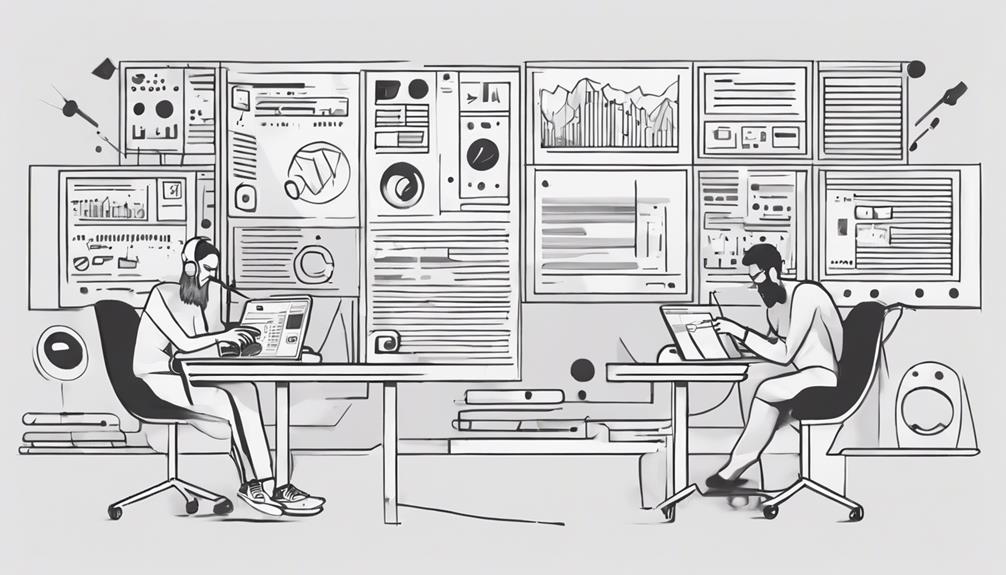
To effectively engage with your audience and promote your music production company, prioritize active interaction on social media platforms. Engaging with your audience on social media is vital for building a strong online presence and attracting potential clients.
Here are some key strategies to enhance your social media engagement:
- Respond promptly to comments and messages to show your audience that you value their input.
- Use analytics tools to track important engagement metrics like likes, shares, and comments to understand what content resonates with your audience.
- Maintain a consistent posting schedule to keep your audience interested and engaged with your brand.
- Collaborate with other musicians and industry professionals to tap into their followers and expand your reach.
- Utilize social media features such as live streaming and stories to connect with your audience in real-time and create a sense of immediacy.
Marketing Strategies

Utilize social media platforms like Instagram and TikTok to highlight your music production skills and attract potential clients effectively. Showcase your work, behind-the-scenes footage, and client testimonials to engage your audience and build credibility.
Collaborating with artists, influencers, and brands for cross-promotion can help expand your reach within the music industry. Offering free workshops or webinars on music production not only demonstrates your expertise but also attracts a wider audience interested in your services.
Additionally, email marketing campaigns are essential for staying connected with clients, sharing updates, and promoting your music production services. Regularly sending out newsletters with valuable content can keep your audience informed and engaged.
Investing in search engine optimization (SEO) is vital to improving your online visibility and driving organic traffic to your music production company website. By implementing these marketing strategies, you can effectively promote your services and grow your music production business.
Building Client Base

Network with artists, bands, and music industry professionals to establish and expand your client base for your music production company.
To build a strong client base, consider the following tips:
- Utilize Online Platforms: Engage with potential clients on social media, music forums, and industry websites to showcase your work and attract new clients.
- Offer Competitive Pricing: Providing competitive rates can make your services more appealing to clients looking for cost-effective solutions.
- Provide Quality Services: Deliver high-quality production services to guarantee client satisfaction and encourage repeat business and referrals.
- Attend Music Events: Networking at music events, conferences, and workshops can help you connect with new clients and industry professionals.
- Collaborate and Share: Collaborate with musicians on projects, share your portfolio online, and ask for referrals to expand your client base effectively.
Frequently Asked Questions
How Do I Start My Own Production Company?
To start your own production company, research the industry, develop a business plan, get licenses, secure funding, and establish an online presence. These steps are essential for success in this competitive market. Good luck!
How to Create a Music Company?
To create a music company, first, register with government agencies, get necessary licenses, secure intellectual property rights, develop contracts, and craft a business plan. These steps are essential to start and run a successful music production enterprise.
What Is Needed to Start Music Production?
To start music production, you need essential equipment like a computer, Digital Audio Workstation (DAW), audio interface, and studio monitors. Obtain licenses from the Copyright Office. Plan your budget for equipment, licensing, and marketing.
How to Start a Music Business?
Starting a music business is like tuning a guitar; it requires precision. Begin by registering your company, obtaining permits, securing rights, crafting a business plan, and networking. These steps will help establish your music production company successfully.
Conclusion
As you commence on this journey to open your music production company, remember that every step you take is a note in your own unique melody.
Each decision you make is a beat in the rhythm of your success.
Keep pushing forward, stay true to your passion, and watch as your dreams come to life in the harmony of your hard work.
The music world is waiting for you to make your mark – don't be afraid to turn up the volume and let your talent shine.

